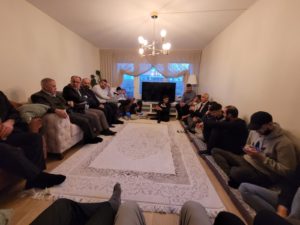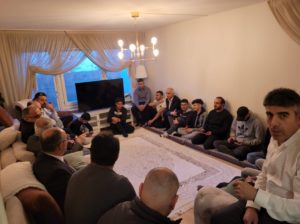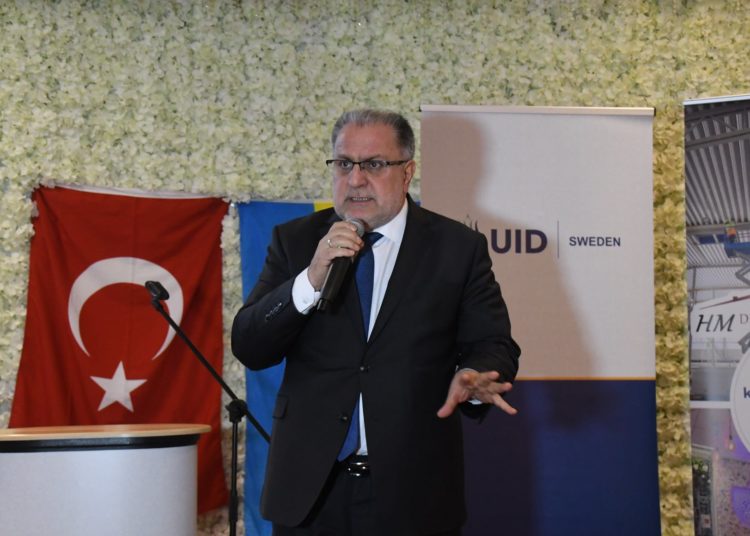Abdullah Bozkurt/Stockholm
Osman Nuri Gülaçar, an al-Qaeda suspect who was previously indicted and briefly jailed on terrorism charges and was investigated along with known al-Qaeda figures including a former Gitmo detainee, had a series of meetings in Stockholm in spring 2022, Nordic Monitor has learned.
Gülaçar, now a member of the Turkish Parliament from the governing party, addressed followers of Turkish President Recep Tayyip Erdoğan in Sweden at gatherings held in a mosque, a private residence and other venues. In his remarks Gülaçar demanded his audience rally in Sweden against the backdrop of violent events in multiple Swedish cities that were sparked by extremist Danish politician Rasmus Paludan’s provocative Quran burnings.
During his April 23-25 stay, he was ushered around by Özer Eken, head of the Swedish branch of the Union of International Democrats (UID), a German-based Turkish organization that has been characterized as the long arm of the Erdoğan government abroad and is especially active in Europe among Turkish and Muslim diaspora communities. The visit was endorsed by Turkey’s ruling Justice and Development Party (AKP), which is led by Islamist President Erdoğan.
A former government imam known for his radical views and staunch support of armed jihad in Syria, Gülaçar, with his contacts in Sweden, must ring alarm bells for observers who have in recent years grown concerned about the radicalization of the country’s Muslim population and immigrant communities by outside influencers.
First page of an investigation into an al-Qaeda cell in Van province. The investigation was launched in 2012 and made public in 2014:
A background investigation into Gülaçar suggests such concerns are well grounded. In an opinion piece published in October 2013 in radical media outlet Haksöz, Gülaçar defended the Taliban in Afghanistan, al-Qaeda in Mali and al-Shabab in Somalia, calling them resistance fighters, and claimed Muslims were pushing back against Western imperialism. “There is no grey area. Everything is black and white, and that is all,” he wrote, urging the government to fully stand behind armed jihad in Syria. He described events in Egypt, where the military ousted Mohamed Morsi amid popular protests and banned the Muslim Brotherhood’s political party, not as an internal conflict but rather as a battle between infidels and Muslims.
Gülaçar was one of 23 suspects detained by police on October 15, 2009 in Turkey’s eastern province of Van during a crackdown on an al-Qaeda network. Of these suspects, he and six others were formally arrested at their arraignment and jailed. He was released pending trial two months later by the Van 3rd High Criminal Court.
When a specially authorized counterterrorism prosecutor in Van launched a fresh investigation in 2012 and police wiretapped communications of al-Qaeda suspects and surveilled their movements, Gülaçar was flagged again as one of the terrorist group’s operatives. Wrapping up his two year investigation, filed under case No. 2012/1361, in January 2014, the prosecutor secured warrants for the police to raid al-Qaeda cells and ordered search and seizure warrants for the suspects’ homes and offices including those of Gülaçar.

The key figure in the new investigation was a Turkish national named İbrahim Şen, a former Gitmo detainee and a convicted, high-profile al-Qaeda militant who served time on multiple charges. Şen was detained in Pakistan over al-Qaeda links and transferred to Guantanamo, where he was kept until 2005, when US officials decided to turn him over to Turkey. Şen had laid low before he resumed his activities on behalf of al-Qaeda and was arrested in 2008 and convicted by a court of law.
According to the 2014 investigation file, Şen had been secretly working with Turkey’s intelligence agency MİT since the Syrian civil war erupted in 2011 and helped move jihadists into Syria and sent them supplies with the help of the intelligence service. The illegal intel operation in Syria was ordered by President Erdoğan and executed by his confidant, MIT chief Hakan Fidan, with a select group of people who were operating outside the boundary of the law.
At the time Gülaçar, while maintaining his close ties to these al-Qaeda cells linked to the intelligence agency, also held a senior position in the provincial party branch of the ruling AKP and was a local politician.
The evidence in the case file was overwhelming, with wiretaps, surveillance records, photos, video footage and other material that revealed how the Erdoğan government sent supplies to al-Qaeda groups in Syria using known al-Qaeda operatives with the help of Turkish intelligence. The Foundation for Human Rights and Freedoms and Humanitarian Relief (İnsan Hak ve Hürriyetleri ve İnsani Yardım Vakfı, or IHH), a Turkish charity front organization with links to jihadist groups, used to send logistical supplies to armed groups in Syria under the cover of humanitarian aid. Al-Qaeda figures were on the payroll of the IHH and were using logistical hubs operated by the organization in various Turkish provinces.
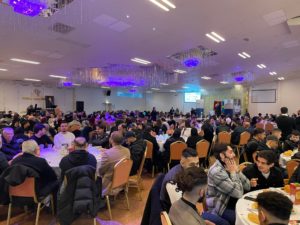
Panicked over the fallout from the case, then-prime minister Erdoğan rushed to interfere in the case and prevented police chiefs and prosecutors from pursing criminal charges. The government abruptly sacked and later dismissed them from the civil service, while the al-Qaeda suspects were allowed to walk free.
The new prosecutor, Ibrahim Koca, specially selected by the government to kill the al-Qaeda probe, decided to drop the case in 2015 and issued a decision of non-prosecution, allowing all the suspects to go free. Just as in the case in 2009, Gülaçar again escaped the grip of the criminal justice system with Erdogan’s help and the government interference in the case.
The new prosecutor who took over the two-year-long al-Qaeda investigation killed the case after the government intervened to hush it up:
As if that were not enough, Gülaçar was also nominated by Erdoğan for mayor of Van in the March 2014 elections, although he lost against the candidate from the pro-Kurdish Peoples’ Democratic Party (HDP). Erdoğan made him a deputy in parliament on the AKP ticket in the June 2018 elections, gifting him with immunity from any criminal charges since lawmakers in Turkey have broad immunity from prosecution while serving in parliament.
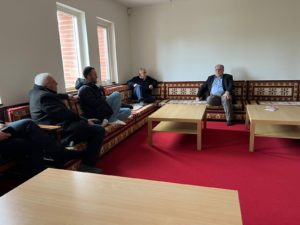
For a while,Gülaçar even had a seat on the AKP’s Central Decision and Administration Board (MKYK), the top executive body of the ruling party. He is still a member of parliament and serves on various committees.
His status as a lawmaker helped Gülaçar travel abroad and even interact with foreign government officials as part of official entourages. He made trips to Sweden in April and May 2022 and had a series of meetings with Erdoğan’s supporters in private homes, mosques and other venues.
At a dinner organized by the UID on April 23 in Stockholm and reportedly attended by some 700 people including then-Turkish Ambassador Emre Yunt, Gülaçar talked about Quran burning incidents by Paludan in Sweden, dismissed freedom of speech arguments and asked the audience to mobilize and launch protests against such acts.
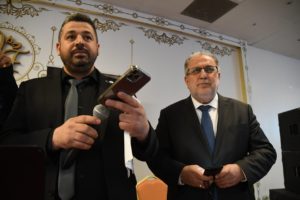
During the dinner, Binali Yıldırım, deputy chairman of Erdoğan’s ruling AKP and a former prime minister, addressed the audience by speakerphone. Far-right Turkish nationalist group İsveç Ülkü Ocakları (Grey Wolfs) leader Sinan Atak and the Turkish Embassy’s religious counsellor Fazlı Arslan and press counsellor Coşkun Uçakkuş were also present, confirming that the event was endorsed by the Turkish government.
Gülaçan returned to Sweden in May as well, this time as a member of a delegation from the Turkish Parliament’s Human Rights Committee, which was on an official visit to learn about the Swedish prison system. Yet right after he visited Sollentuna Prison, Gülaçan and his colleague İbrahim Yurdunuseven held a press event, talking about Quran burnings and protests. They said they condemned the Quran burning incidents and explained how they had raised the issue in their meetings with officials from Sweden’s Justice Ministry and members of the Swedish Parliament, demanding legislative changes to ban such acts.
Having escaped from the long arm of justice in Turkey thanks to blatant interference into criminal cases by Erdoğan and dodging charges filed against him on allegations of involvement in al-Qaeda terrorism, Gülaçan now serves as one of the Erdoğan’s government operatives promoting radical views among Turkish diaspora groups in Europe and recruiting new people to mobilize in foreign countries if and when his boss needs them to use as proxies to advance his political goals.
